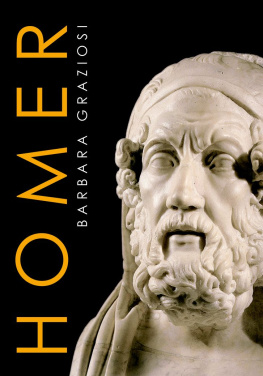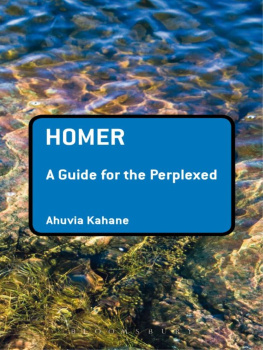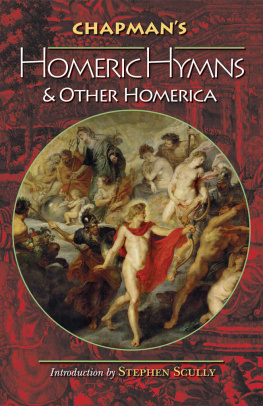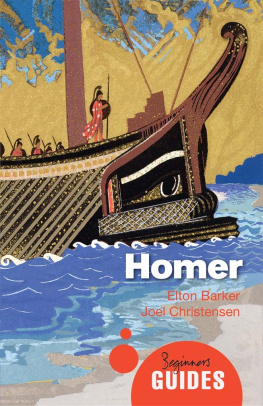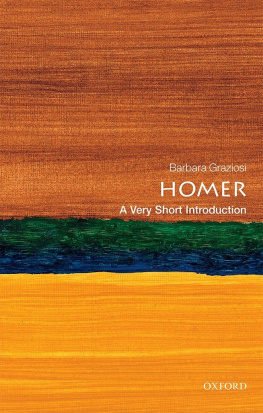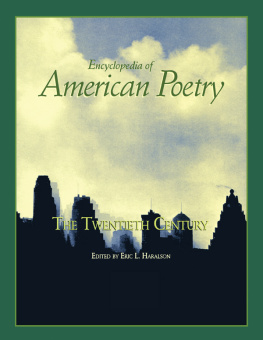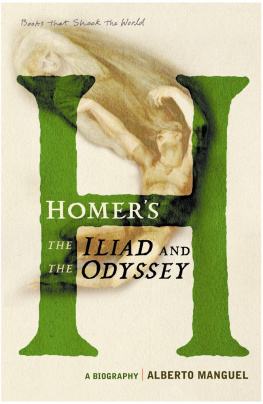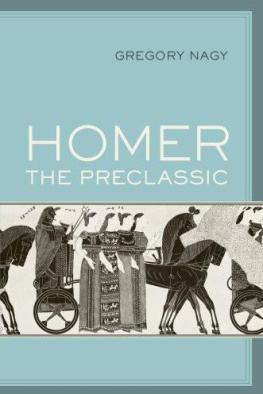CLASSICAL PRESENCES
General Editors
Lorna Hardwick James I. Porter
CLASSICAL PRESENCES
The texts, ideas, images, and material culture of ancient Greece and Rome have always been crucial to attempts to appropriate the past in order to authenticate the present. They underlie the mapping of change and the assertion and challenging of values and identities, old and new. Classical Presences brings the latest scholarship to bear on the contexts, theory, and practice of such use, and abuse, of the classical past.
Homer in the Twentieth Century
Between World Literature and
the Western Canon
Edited by
BARBARA GRAZIOSI
and
EMILY GREENWOOD


Great Clarendon Street, Oxford 0X2 6DP
Oxford University Press is a department of the University of Oxford.
It furthers the Universitys objective of excellence in research, scholarship,
and education by publishing worldwide in
Oxford New York
Auckland Cape Town Dar es Salaam Hong Kong Karachi
Kuala Lumpur Madrid Melbourne Mexico City Nairobi
New Delhi Shanghai Taipei Toronto
With offices in
Argentina Austria Brazil Chile Czech Republic France Greece
Guatemala Hungary Italy Japan Poland Portugal Singapore
South Korea Switzerland Thailand Turkey Ukraine Vietnam
Oxford is a registered trade mark of Oxford University Press
in the UK and in certain other countries
Published in the United States
by Oxford University Press Inc., New York
Oxford University Press 2007
The moral rights of the author have been asserted
Database right Oxford University Press (maker)
First published 2007
All rights reserved. No part of this publication may be reproduced,
stored in a retrieval system, or transmitted, in any form or by any means,
without the prior permission in writing of Oxford University Press,
or as expressly permitted by law, or under terms agreed with the appropriate
reprographics rights organization. Enquiries concerning reproduction
outside the scope of the above should be sent to the Rights Department,
Oxford University Press, at the address above
You must not circulate this book in any other binding or cover
and you must impose the same condition on any acquirer
British Library Cataloguing in Publication Data
Data available
Library of Congress Cataloging in Publication Data
Data available
Typeset by SPI Publisher Services, Pondicherry, India
Printed in Great Britain
on acid-free paper by
Biddles Ltd., Kings Lynn, Norfolk
ISBN 978-0-19-929826-6
1 3 5 7 9 10 8 6 4 2
To Paul Cartledge and Pat Easterling
Acknowledgements
THIS book has its origins in a conference held in Durham from 20 to 23 July 2004. We are grateful to several institutions for their financial support: the British Academy, the Society for the Promotion of Hellenic Studies, the Department of Classics and Ancient History (Durham University), and the School of Classics (University of St Andrews). Several individuals helped us with comments and practical help: we are particularly grateful to Pat Easterling, Edith Hall, Johannes Haubold, Jon Hesk, David Hunt, Greg Woolf, Hedwig Haubold, Victoria Maddocks, and Esther McGilvray. Hilary OShea of Oxford University Press expressed an interest in the project even before the conference had taken place: her patience and support helped us see the book through to its completion. At the time of the conference we benefited from the generous ideas and criticism of the participants: although we cannot name them individually, we would like to record their contribution. At a later stage, the project benefited from the searching comments of the Series Editors and the anonymous reader for Oxford University Press. Ranja Knbl helped us to edit the volume and compile the index with great energy and good humour: her contribution was extremely valuable. Ashley Clements helped with the illustrations. Veronica Ions and Virginia Masardo saved us from many errors and infelicities. We happily acknowledge how much we owe to the contributors to this volume; their individual chapters have prompted us to think harder and further about the plurality of Homeric receptions in the twentieth century; while their commitment and support have made working on this volume an enjoyable experience. We would also like to thank Johannes Haubold and David Milne for their support and encouragement throughout this project, especially during the editing phase. We dedicate this book to Paul Cartledge and Pat Easterling: they supervised our Ph.D. dissertations when we were graduate students in Cambridge and, even while we were grappling with specific aspects of archaic and classical Greece, encouraged us to look beyond Europe and antiquity in search of possible future dialogues.
B. G. and E. G.
Durham and Ballater,
May 2006
Contents
BARBARA GRAZIOSI and EMILY GREENWOOD
JOHANNES HAUBOLD
LORNA HARDWICK
RICHARD MARTIN
STEPHEN MLNTA
BARBARA GRAZIOSI
EMILY GREENWOOD
OLIVER TAPLIN
GREGSON DAVIS
FRANOISE LTOUBLON
DAVID RICKS
SIMON GOLDHILL
SETH L. SCHEIN
List of Illustrations
Romare Bearden, Roots Odyssey (1976), with kind permission of the Romare Bearden Foundation |
Mirella Ricciardi, photograph of a Kenyan warrior: image used as the cover illustration for C. Logue Patrocleia (Scorpion Press, 1969).
Every effort has been made to gain permission from the owner of the image. |
Mike Leigh, Naked: Johnny holding a book (Homer, The Odyssey, Penguin), with kind permission of FilmFour |
Mike Leigh, Naked: Johnny addressing Louise, with kind permission of FilmFour |
Mike Leigh, Naked: the restaurant, with kind permission of FilmFour |
Coen Brothers, O Brother, Where Art Thou?, opening quotation, with kind permission of Universal Studios |
Coen Brothers, O Brother, Where Art Thou?, Big Dan Teague in a rural setting, with kind permission of Universal Studios |
List of Contributors
Gregson Davis is Professor of Classics and Comparative Literature at Duke University, where he is the Andrew W. Mellon Distinguished Professor in the Humanities and Dean of Humanities. His main research foci are Latin literature of the Late Republic and contemporary Caribbean poetry (francophone and anglophone). Among his major publications are Polyhymnia: The Rhetoric of Horatian Lyric Discourse (Berkeley, 1984) and Aim Csaire (Cambridge, 1997). He is currently writing a monograph on Virgils Eclogues.
Simon Goldhill is Professor of Greek at Cambridge University. He has published widely on Greek literature and on the relation between Greek culture and modern culture. His most recent books are Who Needs Greek? Cultural Contests in the History of Hellenism (Cambridge, 2002); The Temple of Jerusalem (London, 2005), and Love, Sex and Tragedy: How the Ancient World Shapes our Lives (Chicago, 2005). His next book is
Next page

